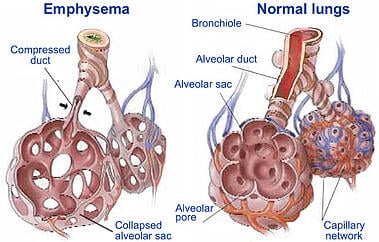Signs and Symptoms of Emphysema
What makes emphysema so tricky and difficult to diagnose at an early stage is the simple fact that symptoms may go unnoticed for many months, and even up to years.
As emphysema progresses and further damage is done to the lungs, patients will begin to feel shortness of breath which is referred to as dyspnea.
At the beginning stages of emphysema dyspnea will occur during times of physical activity, and gradually the disease will get worse and worse eventually causing dyspnea during times of rest or little physical activity.
The dyspnea can eventually take a toll on patients to the point where eating is difficult, which will lead to a reduced appetite and weight loss. Other common signs and symptoms of emphysema include:
- Tightness in the Chest
- Fatigue
- Chronic Cough
- Expanded Chest or "Barrel Chest"
- Clubbing of the Fingers May be Noticed as Emphysema Progresses
- Collapsed Lung
What Leads to Emphysema
Long-term regular cigarette use is the #1 CAUSE of emphysema! Burning a cigarette releases 4,000 known chemicals into the surrounding areas, and many of those chemicals are carcinogenic (cancer causing).
Those carcinogenic chemicals are the reason why 5 out of every 6 lung disease patients were once long-time or still are smokers.
However cigarette smoke is not the only cause of emphysema, excess exposure to air pollution, factory fumes, dust, or burning wood are just a few other common irritants that can leave patients susceptible for developing emphysema.
In very few cases emphysema can be attributed to genetics, which is known as Alpha-1-antitrypsin deficiency.
This is when there is a deficiency in the proteins that protect the elastic structures in the lungs. Other causes for emphysema include:
- Respiratory Infections
- Aging
Treatment Options
The damage that has already been done to the lungs cannot be reversed, but with treatment options, diet changes, and exercise emphysema will be more easily managed and the overall quality of life will improve. Here are some of the most common treatment options:
- Eliminate Smoking - After all this is more than likely the reason you are diagnosed with emphysema, but by stopping smoking the overall progressiveness of the disease will begin to slow.
- Supplemental Oxygen - This is for patients that suffer with extreme dyspnea during times of minimal activity or all throughout their day. This treatment is done with a home oxygen concentrator, portable oxygen concentrator, oxygen tanks, or liquid oxygen that delivers medical grade oxygen to the user through a nasal cannula. Patients must have a prescription for medical grade oxygen in order to purchase an oxygen concentrator.
- Antibiotics - Patients with emphysema are at a higher risk for pneumonia or other infections, antibiotics are needed in order to treat these infections.
- Breathing Techniques - Patients can be taught breathing techniques such as pursed lip breathing to help reduce the feeling of breathlessness, these can also help patients regain their ability to exercise.
If you are experiencing any of the previous symptoms and have been a long time smoker, then speak with your doctor about getting tested for emphysema.
+Caleb Umstead



